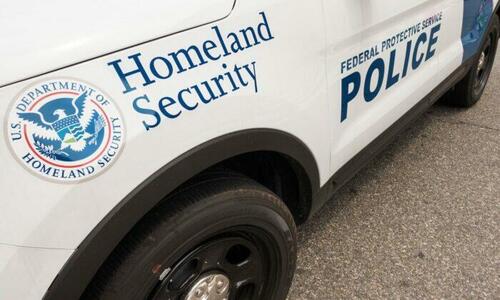Recent Department of Homeland Security (DHS) decisions to monitor trucker protests and link domestic terrorism to misinformation have prompted backlash from some conservatives and civil libertarians, but DHS Counterterrorism Coordinator John Cohen defended his department’s actions at a Feb. 15 online event.
The DHS’s Feb. 7 bulletin warned of a heightened terrorism threat because of “false and misleading narratives,” misinformation, and “conspiracy theories.”
“The United States remains in a heightened threat environment fueled by several factors, including an online environment filled with false or misleading narratives and conspiracy theories, and other forms of mis- dis- and mal-information introduced and/or amplified by foreign and domestic threat actors,” the bulletin said.
Sen. Marsha Blackburn (R-Tenn.) reportedly accused the DHS of “policing” speech in a Feb. 15 letter, while Center to Advance Security in America (CASA) is probing the department over its methodology for crafting the bulletin, according to the Washington Times.
Cohen defended the bulletin at the Feb. 15 online event, hosted by George Washington University’s Program on Extremism. He said the DHS now has “hard analysis” linking violence to narratives about government’s response to COVID-19, the 2020 election, immigration, and race.
“We have tied those narratives specifically to the overwhelming majority of domestic violent extremism incidents,” he said.
“These narratives have, in fact, inspired violence.”
According to Cohen, the threats of information are coming from all directions.
“We also see efforts from ‘foreign and domestic threat actors’ to exacerbate fractures in society by promoting content online and through different parts of the media ecosystem for the purposes of sowing discord, undermining the credibility of the government, and undermining our relationship with allies,” he said.
“And these socio-political narratives they’re promoting online have actually encouraged acts of violence.”
But while the DHS is concerned that conspiracy theories cause terrorism, Cohen insisted that his department is not attempting to chill public dissent.
“Our job’s not to police thought. Our job is to prevent acts of violence. We don’t monitor individuals engaging in constitutionally protected speech,” he said.
“We’ve put in place a series of protections to make sure that as we’re evaluating online content, it’s only relating to threats, and we’re only handling that information in a privacy, civil liberties-protective way.”
Cohen further accused public critics of DHS policy of being disingenuous.
“For public figures, particularly those who know better, to suggest that the DHS is trying to investigate people for their political beliefs—quite frankly, it’s irresponsible, and it may contribute to the volatility of the threat environment,” he said.
Cohen also spoke about the DHS’s warning about trucker protests ahead of the Super Bowl. He said U.S. law enforcement officials have been monitoring trucker protests with their Canadian counterparts, who are treating the demonstrations as matters of national security.
“While there were some people simply there to express their displeasure with vaccine mandates, there were also significant levels of online and physical participation by ideologically motivated violent extremists,” Cohen said of the Canadian protests.
“We began to see calls for similar types of activities in the United States to either expand or replicate what’s going on in Canada.”
Cohen said he saw a similar situation in the United States: Legitimate protest mixed with calls for violence.
“When you start seeing woven into the threads of the planning of these events actual calls for specific violence—referring to the Super Bowl as the ‘Satanic Bowl,’ using calls that coincided with threats against the pharmaceutical industry and government institutions—then it’s something that we have to evaluate and track,” he said.
There were no terrorism events at the Feb. 13 Super Bowl—a fact Cohen attributed to the DHS’s memo.
“Our paying attention to the problem served as deterrence,” he said.








